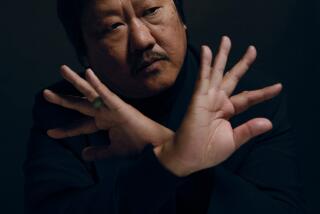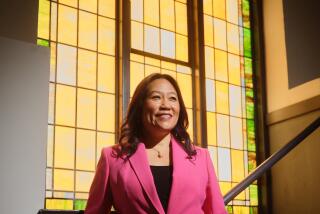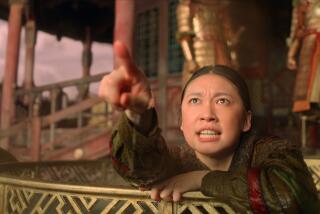‘Jentry Chau vs. the Underworld’ is Echo Wu’s love letter to her childhood
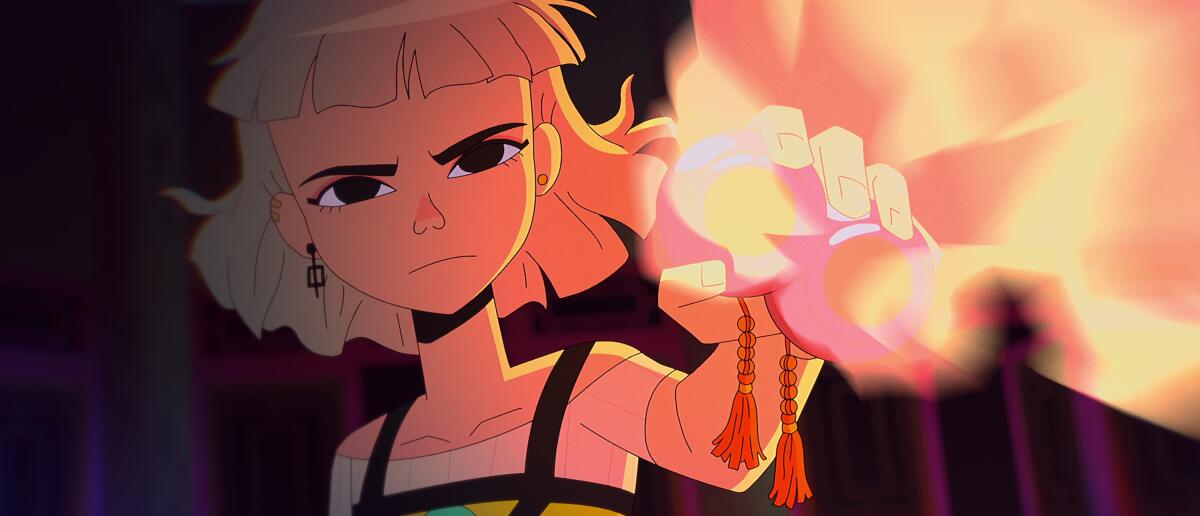
- Share via
Echo Wu was around 5 or 6 years old when she told her parents she wanted to be a cartoonist.
At the time, she’d meant it in the more classical sense of cartooning, like those in magazines or comic books. But she also loved animation, mentioning Pixar films, anime like “Sailor Moon” and even a series about Sun Wukong, the Monkey King, as among the things she watched while growing up.
“It was something that I could watch with my parents, who, at the time, did not speak English very well,” says Wu during a recent video call. “It was storytelling without a language barrier in our family. You could watch ‘Tom and Jerry’ and it doesn’t matter if there’s subtitles because you get the story all the way through.”
So it’s fitting that Wu’s first series, “Jentry Chau vs. the Underworld,” is one that the creator and showrunner describes as “a love letter to my childhood.” Now streaming on Netflix, the animated show follows the eponymous Jentry (voiced by Ali Wong, who also serves as an executive producer), a high school student who learns on her 16th birthday that the demon king of the underworld is after her for the supernatural powers she has struggled to suppress since she was a young child.
An encounter with one of the demon king’s goons leads to Jentry being taken back to her Texas hometown by Gugu (Lori Tan Chinn), her demon-hunting great-aunt, where she has to juggle typical teenage concerns like navigating high school, and deeper ones like learning to control her powers, battling demons and processing unexpected family secrets.
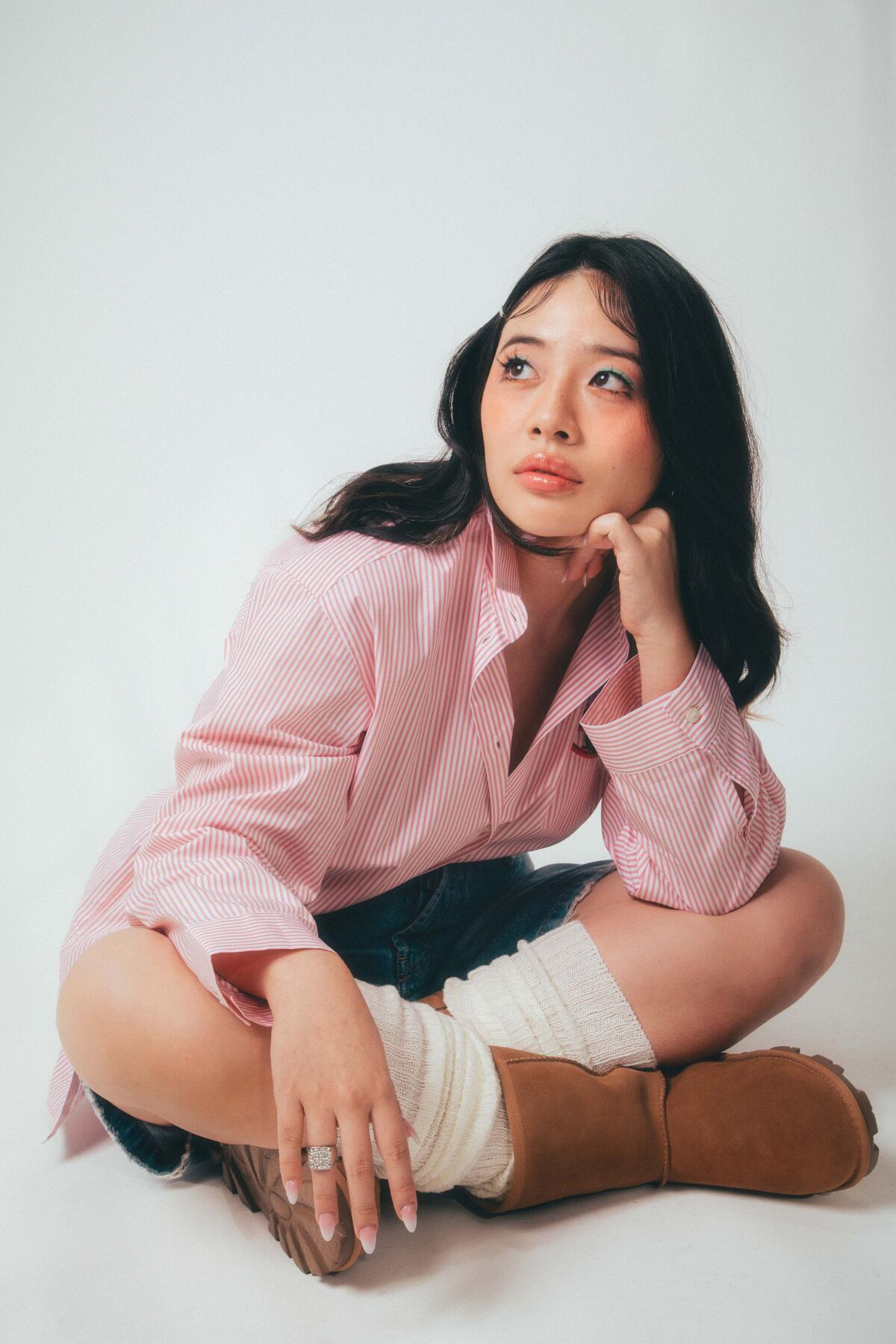
“I wanted to try and make a show that had a lot of different interests of mine combined into one,” Wu says. “There’s horror elements and there’s action, but there’s also teen YA romance.”
For a teenager like Jentry, possessing superpowers that let her fight off demons is not quite something to celebrate. High school and the idea of not fitting in is much more terrifying for her than any supernatural monster.
The show is set “in high school because high school is a place where you’re always scared,” Wu says. “You’re scared of your emotions, you’re scared of doing the wrong thing and getting embarrassed … Talking to a boy, for Jentry, is scarier than having to defeat the mogwai king of the underworld.”
Much of Jentry, Wu explains, is based on her experience and her own personality — so much that there were times that it was hard not to take studio notes about the character personally. (“I can’t help but to fight for her,” Wu says.)
And the monuments and neighborhoods of Jentry’s hometown also resemble that of Wu’s, who was born and raised in the Dallas suburb of Carrollton, Texas. Even some of the furniture in Gugu’s house is based on pieces that were in Wu’s parents’ home.

“Jentry” arrives as Hollywood studios and streamers have pulled back on animation, particularly shows based on original ideas, after scaling up during the height of the streaming wars. Numerous animated shows in various stages of development have been scrapped and even removed from streaming platforms as companies try to cut costs. This risk-averse landscape has also seen studios lean more into existing properties for reboots and revivals.
“The goal of the show has always been to feel original and to feel like it’s a new take on things,” Wu says. ”I hope it sparks more original ideas to [make it] through the ringer and the thunderdome that is development and the production process.”
Although Wu studied animation in school, earning a degree in computer animation, “Jentry Chau vs. the Underworld” marks her first Hollywood project. She says that spearheading her first show without having prior experience on other series — which would have included a glimpse of what it was like to see something she worked on released into the world — was “scary.”
“It was very trial-and-error on this very first show,” Wu says. “It feels like I grabbed a bunch of cheat codes in this game and then started at level 20 and kind of ran with it. It’s such a vulnerable feeling right now [because] it’s so close to my own childhood experience and … you’re watching comments on the trailers drop and people don’t realize this is a thing that other human beings worked on.”
Wu started pitching the show in 2020, but she can trace some of the ideas that eventually evolved into “Jentry” back to when she moved to Los Angeles in 2017.
“I was taking a walk one day and I [thought] ‘I really want to make something about a jiangshi,’ a Chinese hopping vampire,” Wu says. “They are such a cool monster that are kind of utilized in pop culture but not enough.”
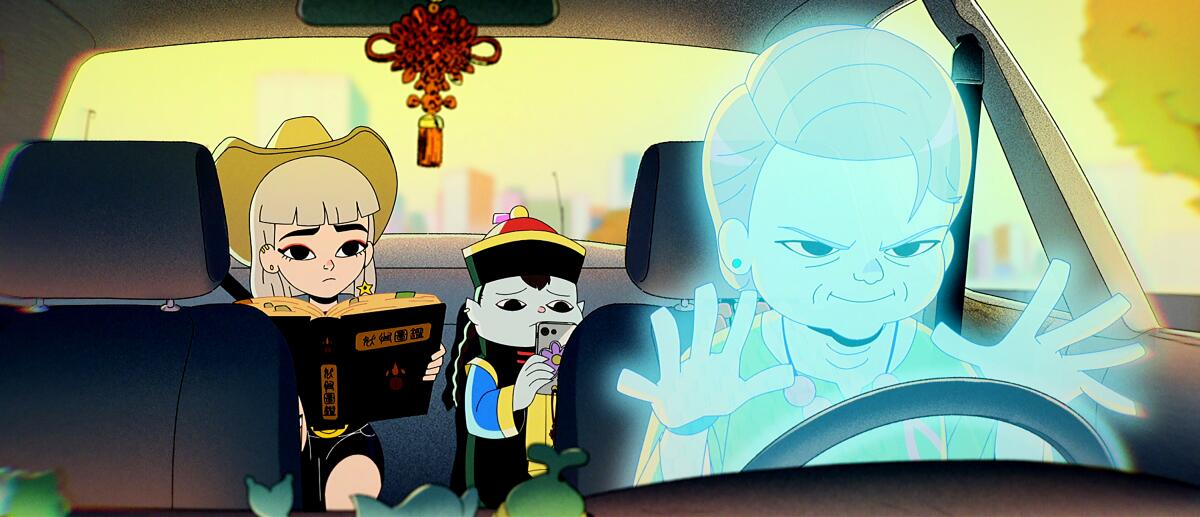
That idea, eventually, led to the conception of Ed (Bowen Yang), a jiangshi who worms his way into Jentry’s life to become her supernatural sidekick and bestie. Among the considerations Wu worked through before the character became the aspiring social media star audiences meet in the series was how a jiangshi would get to Texas in the first place and why.
“The idea was that this jiangshi shipped himself from the Chinese underworld to America to pursue this big American dream of being a scary monster,” Wu says. And although elements like the story’s tone and style evolved as Wu worked through different iterations of the script, she says “that comedy in Ed never strayed from the original idea.”
In its earliest stages, “Jentry” was conceived as more like an animated family comedy, Wu explains. But over the course of the pandemic, she became more interested in engaging with the heavier themes the series tackles, which include intergenerational trauma and struggling with familial expectations.
As a result, many elements of Jentry’s coming-of-age story features added nuance. The show’s love triangle is not just about Jentry choosing a boy but also about how she views her supernatural powers and her connection to them. The show’s villains are not just the demons from the underworld Jentry faces in battle but the people closest to her and how the choices they’ve made have affected her.
“Having to grapple with a complicated relationship with your family members and a complicated relationship with yourself and your identity, that’s always been the thing that I thought was most appealing about ‘Jentry,’” Wu says.
More to Read
The complete guide to home viewing
Get Screen Gab for everything about the TV shows and streaming movies everyone’s talking about.
You may occasionally receive promotional content from the Los Angeles Times.
